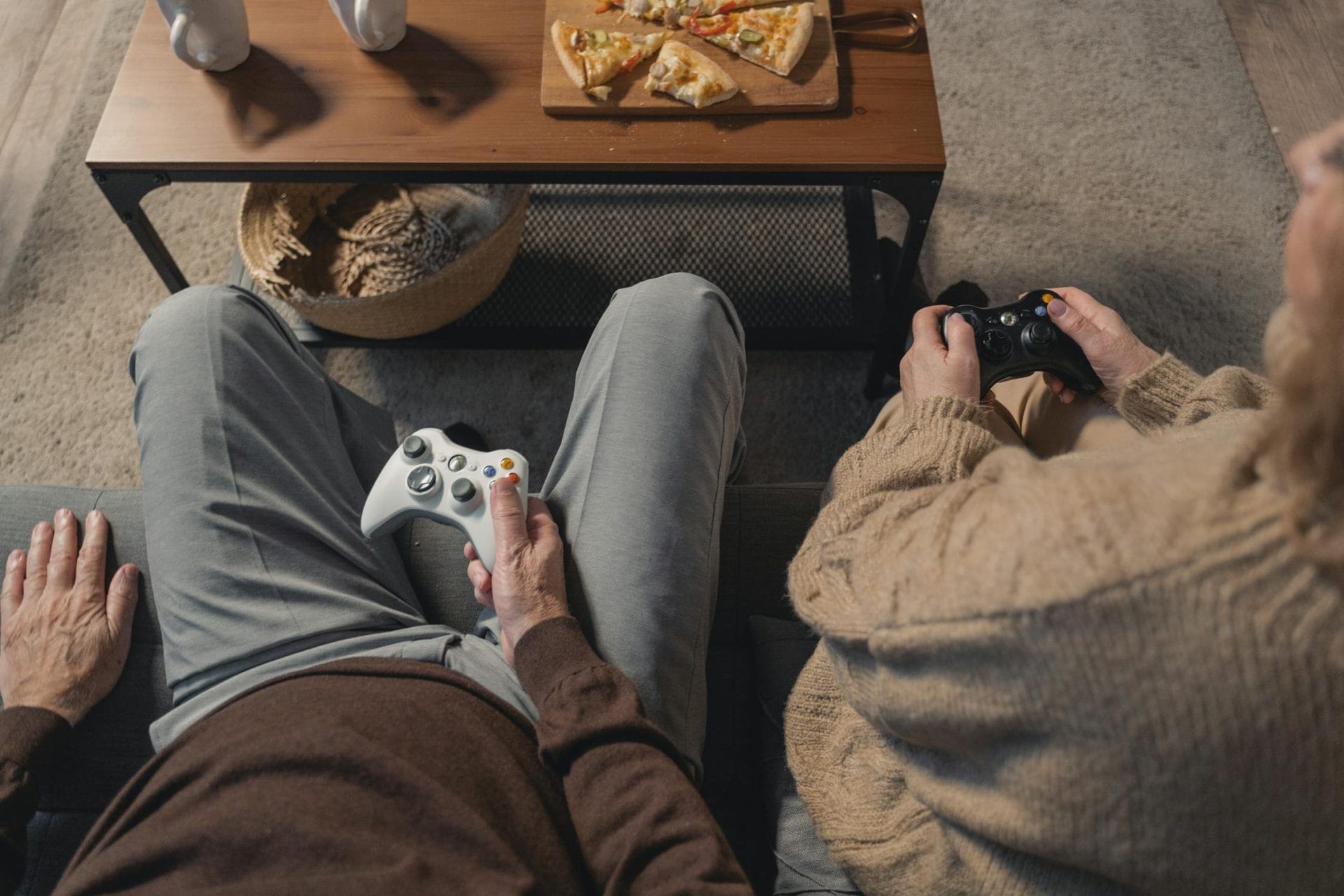Why Playing Games Is The New Hobby We All Need. Research suggests that having a hobby can boost your body and mind, but a recent survey shows that over 60% of young people in the UK have never taken up a hobby.
There are all kinds of activities to choose from, with some more popular among certain demographics than others.
While gaming is often associated with teens and young adults, it can be beneficial for all ages.
In this guide, we’ll explore the incredible benefits of playing games and explain why it’s the new hobby we all need in our lives. If ever you needed an excuse to play more, this is it.

Reducing stress levels
Stress is one of the most significant modern-day public health challenges.
While mild stress affects most people frequently and is relatively easy to manage, severe stress can be harmful.
One of the main reasons to embrace playing games as a hobby is to lower stress levels.
Stress can be a good thing.
It can push us to try harder and achieve more, but it can also spiral quickly.
If you feel overwhelmed or constantly under pressure, it’s important to take action.
Hobbies offer a simple, effective self-help technique to combat stress.
There are several reasons why playing games is a stress-buster.
Whether you enjoy Chess, Sudoku or Monopoly, you’re a fan of video games, or you love playing Minesweeper in your spare time, you can improve your mood instantly.
When you’re in the throes of a game of Minesweeper, your goal is to clear the board without detonating the mines.
When you’re caught up in this world, you don’t have to think about anything that is stressing you out, worrying you or bringing your mood down.
Gaming distracts you from stressors and triggers, it’s fun, and it provides an outlet if you’re experiencing difficult emotions, such as anger or frustration.
Playing games and solving puzzles can also help you relax, feel calm and enjoy a sense of achievement.
Focusing your mind on something other than work, family commitments, finances, and other potential sources of stress also helps you feel more content.
Another key reason to take up gaming as a hobby to reduce stress is bringing more fun to your day.
Many of us have busy work schedules and we don’t have much time to enjoy ourselves and wind down.
Playing games offers a golden opportunity to relax, have fun, and catapult yourself to a different universe.
Whether you’re flying through magical kingdoms or taking on the computer in a gruelling battle of minds, games provide a welcome break.
YouGov research indicates that most people play games to unwind, with almost 70% of gamers citing relaxation as the main motivation.
Exercising your brain
When you think about exercise, it’s natural for images of the gym, yoga classes or running shoes to pop into your mind.
Physical activity offers a raft of benefits for your body, including improving muscle tone and strength, boosting cardiovascular fitness and lowering the risk of heart disease and type 2 diabetes.
Just as your body benefits from regular workouts, your brain thrives on frequent exercise.
Gaming is a brilliant way to exercise your brain.
All games test your brain in some way.
From intense strategy games to card games that require you to think on your feet and puzzles that demand high levels of concentration and acute problem-solving skills, playing games is an effective workout.
Exercising your brain can help improve cognitive functions, such as memory and recall.
Studies show that gamers are also more likely to have better concentration than people who don’t play games.
In some cases, it can take hours or even days to win a war, solve a puzzle or outsmart a rival.
When you play games, you learn to focus and maintain concentration for prolonged periods.
In some cases, playing games can also improve your reaction time.
This is common when playing video games, which involve making movements rapidly and responding to changes in the environment or challenge.
If you’re fighting enemies, for example, you may need to duck swiftly or swerve virtual bullets or weapons.
If you’re whizzing around a race circuit, you may need to brake suddenly or steer away from other cars.
Quick reactions are beneficial for gameplay, but they can also help you stay safe in real-life scenarios and settings, from driving and playing sports to acting fast in emergency situations.

Building relationships
We often think about playing games, particularly video games and online card and board games and puzzles, as solo activities, but gaming can be a very sociable hobby.
Many people enjoy playing with friends and family members either in person or virtually.
For those who don’t have willing teammates or opponents waiting in the wings, there’s a chance to meet new people and join communities.
You can challenge others at any time of day or compete against the computer.
Websites and apps that offer online puzzles and games often provide access to communities and leagues, which offer opportunities to build relationships.
There’s a great deal of debate about the role of technology in modern society when it comes to social skills and socialising.
While some people may think of gaming as a solitary pursuit, which could hamper establishing connections in the real world, for many, it’s a hobby that helps them feel less lonely or isolated.
If you enjoy games, you can play with or against others, no matter where you are or what time it is.
You have unbarred access to communities of people who share your interests.
Building relationships is pivotal at a time when loneliness is prevalent, especially among youngsters.
Studies show that between 25% and 27% of people aged between 15 and 29 feel ‘very’ or ‘fairly’ lonely globally.
While playing games online shouldn’t replace making friends in the real world, it can bridge gaps, help individuals feel confident and complement real-world physical interactions.
Learning to multitask like a pro
The way we live has changed.
Today, multitasking is no longer a preferred skill.
It’s an essential requirement of everyday life.
Most of us have a lot going on.
We’re spinning multiple plates every single day.
For some people, multitasking comes naturally, but for others, it’s a challenge.
If you find it hard to juggle several balls at once or make decisions quickly, gaming is a great choice of hobby.
When you play games, you often have to think about different options, make decisions repeatedly and manage multiple tasks at the same time.
Playing games regularly can help you hone your skills.
You can then benefit from sharp multitasking skills in other areas of your life, from running your household efficiently to taking control of your diary.
Expanding your knowledge base
Playing games is fun, but it can also be educational.
There’s a lot of talk about the negative impact of screen time, but doing quizzes and puzzles and playing games can aid learning.
You can learn new things by playing games and tackle specific topics or subjects through targeted game-based exercises and interactive resources.
Playing games makes education fun. It can enhance memory, comprehension and information retention in some people.
Visual media and interactive activities often make it easier to understand than reading text or listening to somebody talking about a concept or theory.
As games are designed to be fun, you can expand your knowledge base and learn without even realising.
Using your time constructively
We often complain about a lack of time in our busy lives, so when you have spare time, it’s important to make the most of it.
Gaming can help you use your time constructively if you enjoy games and puzzles and you manage your diary in a way that allows time for varied interests.
Playing games is an excellent way to access entertainment and pass the time if you’re waiting for an appointment, you’re travelling, or you’ve got a bit of time between meetings or classes.
Whenever you load a game of Minesweeper, start a new game of Chess, or fire up your console, you can exercise your brain, learn, form connections with others, de-stress, have fun, and take a break.
It’s helpful to have easy access to your favourite apps and websites so you can play whenever you have time.
It’s also advisable to enjoy a diverse range of hobbies.
Spending time outside and doing regular physical activity are hugely beneficial for mental health and well-being.
Hiking, water sports, wild swimming, running, cycling, and climbing are great examples of outdoor hobbies that will boost your body and mind.
 Studies show that taking up hobbies offers several benefits for your physical and mental health.
Studies show that taking up hobbies offers several benefits for your physical and mental health.
If you’re looking for a new hobby or you’re on a mission to boost your health and well-being, have you thought about gaming?
From video games to online puzzles and quizzes, there are all kinds of options to choose from.
Playing games regularly can improve cognitive function, provide hours of fun, reduce stress levels, help you socialise and enable you to learn new skills.
Hope you’ve found our article, Why Playing Games Is The New Hobby We All Need useful.
Thank you for taking the time to read my post. If you’d like to add a comment or thought on this post, please use the comments section below. I can also be contacted via the online contact form. Keep up to date with the latest news on social media.

